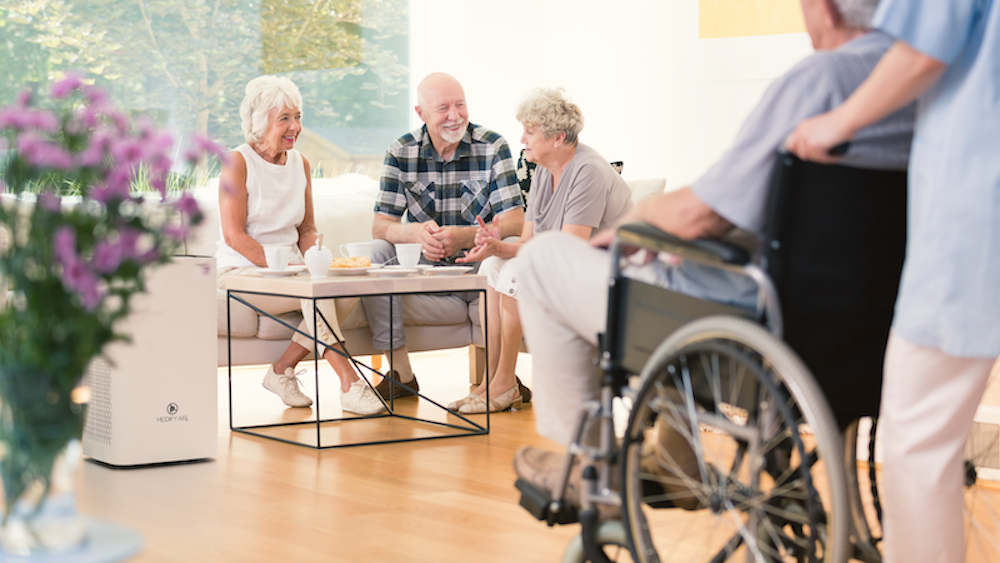The American population is aging rapidly. In fact, by 2030 all baby boomers will be 65 or older. That’s one reason for the increase in senior community residence. This fact necessitates a change in the way we think about senior communities. Far from the “nursing homes” of past decades, today’s senior living options are modern, vibrant, and even luxurious. At the same time, COVID-19 placed a renewed focus on health and safety measures. As the target population gets choosier, senior communities are looking for ways to stand out from their competition. Here are some of the innovative upgrades we’ve noticed top senior living facilities implementing.
More dining options
Today’s seniors are more likely to treat mealtime as an activity. They want the option of “going out” to eat, restaurant-style. At the same time, the ability to have food delivered to individual rooms is important. Residents want choices when they dine, and they are more concerned with fresh and locally sourced ingredients. Many people like organic food and even want to understand where their food is coming from. Residents also expect special diets to be considered, and may prefer dining rooms that can offer vegetarian or vegan options. Cozy cafes, coffee shops, or pub environments have become more popular in some areas. Essentially, residents want choice. Top communities offer those choices for what, where, and when to eat.
The latest technology
Staying connected to friends and loved ones is key for seniors’ mental and even physical health. The individuals who help senior residents choose a new home often look for technology that will make it easier for them to stay in touch. At the same time, technology needs to be simple to navigate. TV providers and streaming services need to be user-friendly. The Internet should be wireless, with top speed. Security measures may include things like doorbell cameras that can be viewed by an app. Some communities even offer smart speakers so that residents can easily play music, create shopping lists, etc. Just offering the technology isn’t enough - staff should be prepared to help residents feel comfortable and make the most of modern tools.
Additional fitness options
Most senior communities offer a fitness room. Modern senior communities are adding amenities like a pool, sauna, yoga room, or classes. Having fitness instructors come in and host classes is a nice way to encourage residents to stay active. Some communities also offer nutrition classes or even a juice bar to visit at the end of a workout. Massage, meditation, and other holistic wellness guidance are a great way for seniors to prioritize their health (and maybe even make some new friends in the process).
Easy access to nature
Getting some fresh air and enjoying nature is good for everyone, not just seniors. Many communities are looking for more ways to allow residents to take advantage of the outdoors. Everything from walking trails to gardens to outdoor fire pits can help seniors to change up their routine (or create a new one) and get out and about. Look for plenty of benches along trails, as well as spaces where groups can congregate and tables for eating outside.
Air purification systems
Most senior communities have always been cautious about the health of their residents, but COVID-19 brought to light some of the problems that are especially apparent in older people living in a group environment. In fact, the COVID-19 virus is spread through exposure to infectious respiratory fluids. According to the CDC, many of the cases in the USA have occurred among older adults living in nursing homes or long-term care facilities. Low air quality has several short-term and long-term effects. Medical experts say that an environment with low air quality can cause significant discomfort and lead to increases in sickness among elderly individuals living in nursing homes. That’s why many senior communities are investing in high-quality air purifiers. An air purifier with a HEPA or better air filter will remove fine particles, gasses, and respiratory matter that can spread illness, as well as other common irritants like mold and mildew particles. Modern buildings are likely to have a large, powerful unit that can clean up to 3,700 feet each hour in open community spaces or a series of smaller units for each resident’s room.
Medify offers several innovative options for air purification. To learn about which unit might be right for your space, reach out to one of our experts.


